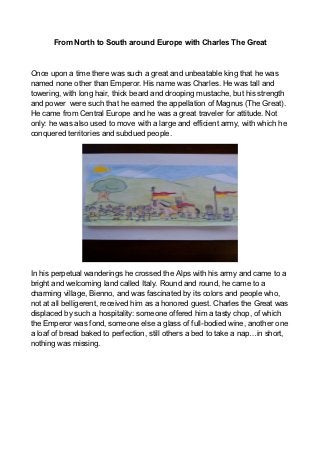
TALE SALAD ITALY - chapter 1
- 1. From North to South around Europe with Charles The Great Once upon a time there was such a great and unbeatable king that he was named none other than Emperor. His name was Charles. He was tall and towering, with long hair, thick beard and drooping mustache, but his strength and power were such that he earned the appellation of Magnus (The Great). He came from Central Europe and he was a great traveler for attitude. Not only: he was also used to move with a large and efficient army, with which he conquered territories and subdued people. In his perpetual wanderings he crossed the Alps with his army and came to a bright and welcoming land called Italy. Round and round, he came to a charming village, Bienno, and was fascinated by its colors and people who, not at all belligerent, received him as a honored guest. Charles the Great was displaced by such a hospitality: someone offered him a tasty chop, of which the Emperor was fond, someone else a glass of full-bodied wine, another one a loaf of bread baked to perfection, still others a bed to take a nap…in short, nothing was missing.
- 2. One morning, while walking through the streets, his attention was caught by a large glow emanating from a building a little apart. He approached and peered inside: a man in a vest, a guy named Battista the blacksmith, with a kerchief on his head, was bent in front of a huge oven with some tools in his hands; a large hammer, moved by the water was beating up and down, bang- bang-bang, on these tools and here the incandescent material taking shape and, as if by magic, turned into objects of great value and utility: buckets, spades, hoes, various tools, all in wrought iron. “Wow!” Charles thought, “this man is a wizard, I want him to come with me, to my castle, where he will forge the finest armor ever seen”. When he expressed his intentions, the craftsman was desperate and he said crying and begging: “Sire, I have a wife and children, don’t take me away from them, I would die! I will work hard to make the most resistant and precious armor on earth and I will send them to you, but please, have pity on me”. The great Charles, who was basically a sentimental man, was touched by this pleading and, wiping a tear furtively, he roughly answered: “We will see, I will think about that”. And he took his leave.
- 3. His wanderings led him in front of carpenter James’ laboratory, where Charles was impressed by the mastery with which the artist was working inert pieces of wood that came to life and turned into solid and refined furniture. “Here is a man for me”, Charles thought, “he could make my palace unique in the world”. But when the Emperor expressed his desire to take him, James also asked not to tear him away from his affections. Reserving to decide, Charles went on his way and came close to a mill. Curious he went in and saw John the miller next to the fireplace, while mixing with force a yellowish food cooked in a pot. “What’s that?” Charles asked. “It’s polenta made with corn flour, Your Majesty” was the answer. And he offered him a large slice, served with milk and cheese. “It’s delicious!” Charles pointed out. “I’ll take you to my palace, so every day you can make this delicacy for me and my court”. Hearing these words John began sobbing and was saying: “Oh, my poor children! And my holy wife, what will she do?” Fearing of being regarded as one who let himself be outdone by tenderness, Charles went away slamming the door. It is known that in a small village people whisper and news speed along, so much that the local Lord, the Marquis Ubaldo, was very worried. He ordered his servant: “Invite the Emperor to my palace, prepare all sorts of goodies and let’s welcome him with full honors worthy to his stock”. Got the message,
- 4. Charles appeared at lunchtime and, after some pleasantries, the two lords shared a sumptuous meal, in which they were served red meat and game in all kinds, homemade pasta and mouth-watering desserts. At coffee time all the nobles of the village came upon in delegation, all to beg Charles to allow the blacksmith, the carpenter and the miller to remain in Bienno. They promised that every year they would send as a gift armor and furniture and corn flour, but that, for his goodness, he saved the families. Faced with such requests, humbly carried out without arrogance, Charles could not say no. Thus, summoned the mighty army, he greeted the inhabitants in Bienno and resumed his journey.
